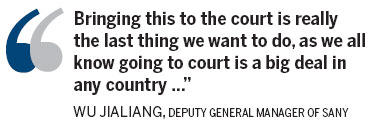Decision to bar deals violated firm's rights, lawyers argue
Ralls Corp, owned by executives of Chinese industrial giant Sany Group Co Ltd, has asked a federal judge in Washington to hear its case against US President Barack Obama's decision to scrap the purchase of four wind-farm projects near a US navy facility in Oregon.
But some experts say the chances of Sany winning the case against Obama are slim.
|
Wu Jialiang (right), deputy general manager of Sany Group Co Ltd and CEO of Ralls Corp, a US-based company affiliated with Sany, talks to the media in front of the Federal District Court in Washington DC, on Wednesday (US time). Sany is suing US President Barack Obama over his order that barred the company from owning four wind farms in Oregon. [Sun Chenbei / China Daily] |
Lawyers for Delaware-based Ralls told US District Judge Amy Berman Jackson at a two-hour hearing on Wednesday that the company's rights were violated by the Sept 28 decision to bar the wind-farm deals due to an unspecified national security risk. The company also argues that it has not been given a chance to address the Obama administration's concerns.
Ralls argued that Obama's move could cost the company at least the $20 million it has spent on design and construction since acquiring the Oregon sites.
"Bringing this to the court is really the last thing we want to do, as we all know going to court is a big deal in any country, either in China or the United States," Wu Jialiang, a Sany deputy general manager and co-owner of Ralls, told China Daily after the hearing.
"Had we been given fair treatment and the opportunity to discuss this decision, we wouldn't have come this far," he said.
Tim Cullen, partner with US law firm Jones Day, who specializes in global trade disputes, said the case is "virtually unprecedented, because Sany and Ralls are challenging both the action of the CFIUS (Committee on Foreign Investment in the United States) and discretion of the president".
He said the government may argue that the judge should not become involved because it is a matter of national security.
The case was "appealing" as it showed strong needs for a review, but the chances for it proceeding still hinged on presidential discretion, Cullen said.
Many legal commentators and academics think the US government has a favorable chance in the case.
Clif Burns, a lawyer with Washington firm Bryan Cave LLP who specializes in export controls and economic sanctions, said: "The Exon-Florio amendment specifically exempts presidential decisions such as this from judicial review, so Ralls' lawsuit has virtually no chance of being successful."
He was referring to a federal law enacted in 1988 that provides for scrutiny of foreign investments.
Burns said: "I don't think that Obama's decision to block (the wind-farm deals) will have much effect on future Chinese investment in the US because of the unique security concerns posed by this investment."
But Cullen said the case could have various consequences, one being that the committee on foreign investment may have to adopt more regular procedures and more transparency in dealing with such cases.
Cullen also said China has been a promising source of capital for investment worldwide. Although there have been incidences where investment has stopped, this was only on a small scale, and the US market would eventually get used to Chinese investment.
He compared the trend to the expansion of Japanese investors from the 1980s onwards. "There was a lot of concern over the dramatically increasing Japanese share of the car market, but over a period of time people just get used to the ideas that they would make Hondas and Toyotas and this is perfectly good for the country.
"The aggressive adaptation by China and Chinese enterprises to the rule of law is one of the greatest legal stories of my career," Cullen said.
Ann Lee, a New York University economics professor, said the case is not likely to have an impact on other Chinese investments, especially smaller transactions that do not involve technology or natural resources.
"The case will be a near impossibility to win, since rarely do private interests have the resources or political capital to go against a government which makes all the rules," Lee said.
"But it will be a good way for the Chinese to get experience in working the US legal system, even if they lose."
Contact the writers at [email protected] and [email protected]

